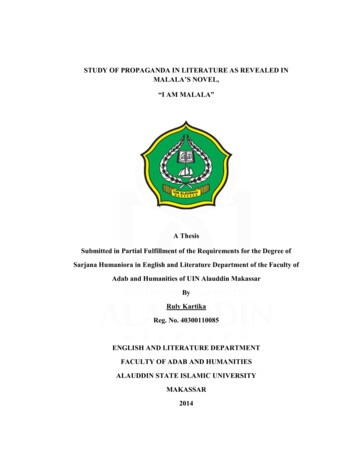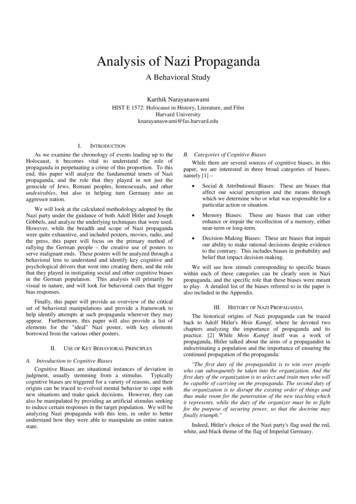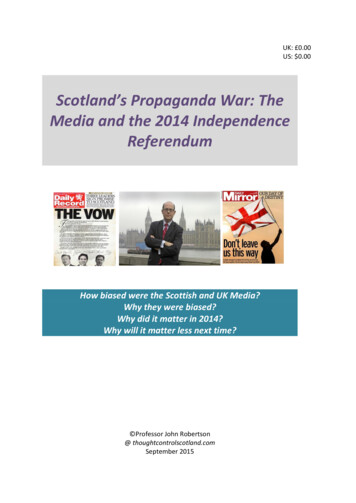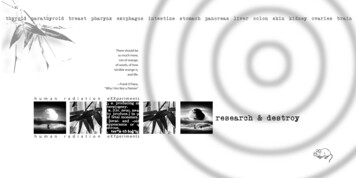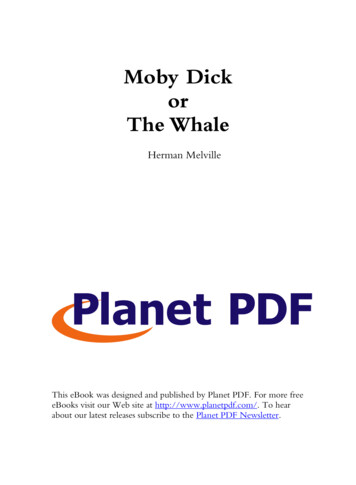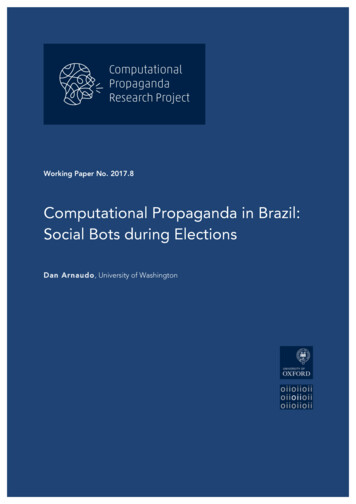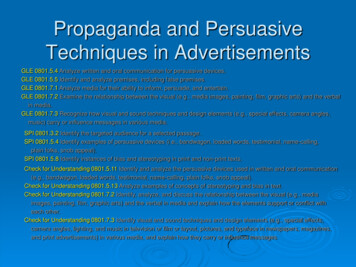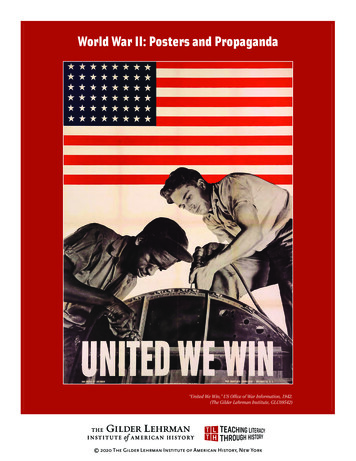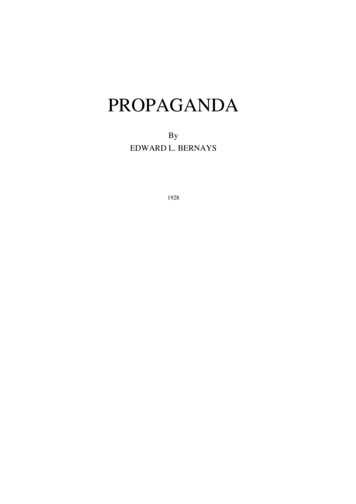
Transcription
PROPAGANDAByEDWARD L. BERNAYS1928
CONTENTSI.ORGANIZING CHAOS .9II.THE NEW PROPAGANDA .19III.THE NEW PROPAGANDISTS32IV.THE PSYCHOLOGY OF PUBLIC RELATIONS47V.BUSINESS AND THE PUBLIC62VI.PROPAGANDA AND POLITICAL LEADERSHIP 92VII.VIII.IX.WOMEN'S ACTIVITIESAND.PROPAGANDAPROPAGANDA FOR EDUCATIONPROPAGANDA IN SOCIAL SERVICE .115121135X.ART AND SCIENCE .141XI.THE MECHANICS OF PROPAGANDA150.
CHAPTER IORGANIZING CHAOSTHE conscious and intelligent manipulation of theorganized habits and opinions of the masses is animportant element in democratic society. Those whomanipulate this unseen mechanism of society constitute an invisible government which is the true rulingpower of our country.We are governed, our minds are molded, ourtastes formed, our ideas suggested, largely by menwe have never heard of. This is a logical result ofthe way in which our democratic society is organized.Vast numbers of human beings must cooperate inthis manner if they are to live together as a smoothly functioning society.Our invisible governors are, in many cases, unaware of the identity of their fellow members in theinner cabinet.They govern us by their qualities of natural leadership, their ability to supply needed ideas and by theirkey position in the social structure. Whatever attitude one chooses to take toward this condition, itremains a fact that in almost every act of our dailylives, whether in the sphere of politics or business,in our social conduct or our ethical thinking, we are9
Propagandadominated by the relatively small number of persons—a trifling fraction of our hundred and twentymillion—who understand the mental processes andsocial patterns of the masses. It is they who pull thewires which control the public mind, who harness oldsocial forces and contrive new ways to bind and guidethe world.It is not usually realized how necessary these invisible governors are to the orderly functioning ofour group life. In theory, every citizen may votefor whom he pleases. Our Constitution does notenvisage political parties as part of the mechanismof government, and its framers seem not to havepictured to themselves the existence in our nationalpolitics of anything like the modern political machine. But the American voters soon found thatwithout organization and direction their individualvotes, cast, perhaps, for dozens or hundreds of candidates, would produce nothing but confusion. Invisible government, in the shape of rudimentarypolitical parties, arose almost overnight. Ever sincethen we have agreed, for the sake of simplicity andpracticality, that party machines should narrow downthe field of choice to two candidates, or at most threeor four.In theory, every citizen makes up his mind onpublic questions and matters of private conduct. Inpractice, if all men had to study for themselves theabstruse economic, political, and ethical data involved10
Organizing Chaosin every question, they would find it impossible tocome to a conclusion about anything. We havevoluntarily agreed to let an invisible governmentsift the data and high-spot the outstanding issues sothat our field of choice shall be narrowed to practicalproportions. From our leaders and the media theyuse to reach the public, we accept the evidence andthe demarcation of issues bearing upon public questions; from some ethical teacher, be it a minister, afavorite essayist, or merely prevailing opinion, weaccept a standardized code of social conduct to whichwe conform most of the time.In theory, everybody buys the best and cheapestcommodities offered him on the market. In practice,if every one went around pricing, and chemicallytesting before purchasing, the dozens of soaps orfabrics or brands of bread which are for sale, economic life would become hopelessly jammed. Toavoid such confusion, society consents to have itschoice narrowed to ideas and objects brought to itsattention through propaganda of all kinds. Thereis consequently a vast and continuous effort going onto capture our minds in the interest of some policy orcommodity or idea.It might be better to have, instead of propagandaand special pleading, committees of wise men whowould choose our rulers, dictate our conduct, privateand public, and decide upon the best types of clothesfor us to wear and the best kinds of food for us to11
Propagandaeat. But we have chosen the opposite method, thatof open competition. We must find a way to makefree competition function with reasonable smoothness. To achieve this society has consented to permitfree competition to be organized by leadership andpropaganda.Some of the phenomena of this process are criticized—the manipulation of news, the inflation ofpersonality, and the general ballyhoo by which politicians and commercial products and social ideas arebrought to the consciousness of the masses. The instruments by which public opinion is organized andfocused may be misused. But such organization andfocusing are necessary to orderly life.As civilization has become more complex, and asthe need for invisible government has been increasingly demonstrated, the technical means have beeninvented and developed by which opinion may beregimented.With the printing press and the newspaper, therailroad, the telephone, telegraph, radio and airplanes, ideas can be spread rapidly and even instantaneously over the whole of America.H. G. Wells senses the vast potentialities of theseinventions when he writes in the New York Times:"Modern means of communication—the powerafforded by print, telephone, wireless and so forth,of rapidly putting through directive strategic or technical conceptions to a great number of cooperating12
Organizing Chaoscenters, of getting quick replies and effective discussion—have opened up a new world of political processes. Ideas and phrases can now be given aneffectiveness greater than the effectiveness of anypersonality and stronger than any sectional interest.The common design can be documented and sustainedagainst perversion and betrayal. It can be elaboratedand developed steadily and widely without personal,local and sectional misunderstanding."What Mr. Wells says of political processes isequally true of commercial and social processes andall manifestations of mass activity. The groupingsand affiliations of society to-day are no longer subjectto "local and sectional" limitations. When the Constitution was adopted, the unit of organization wasthe village community, which produced the greaterpart of its own necessary commodities and generatedits group ideas and opinions by personal contact anddiscussion directly among its citizens. But to-day,because ideas can be instantaneously transmitted toany distance and to any number of people, this geographical integration has been supplemented by manyother kinds of grouping, so that persons having thesame ideas and interests may be associated and regimented for common action even though they livethousands of miles apart.It is extremely difficult to realize how many anddiverse are these cleavages in our society. They maybe social, political, economic, racial, religious or eth13
Propagandaical, with hundreds of subdivisions of each. In theWorld Almanac, for example, the following groupsare listed under the A's:The League to Abolish Capital Punishment; Association to Abolish War; American Institute ofAccountants; Actors' Equity Association; ActuarialAssociation of America; International AdvertisingAssociation; National Aeronautic Association; Albany Institute of History and Art; Amen Corner;American Academy in Rome; American AntiquarianSociety; League for American Citizenship; American Federation of Labor; Amorc (Rosicrucian Order); Andiron Club; American-Irish HistoricalAssociation; Anti-Cigarette League; Anti-ProfanityLeague; Archeological Association of America; National Archery Association; Arion Singing Society;American Astronomical Association; Ayrshire Breeders' Association; Aztec Club of 1847. There aremany more under the "A" section of this verylimited list.The American Newspaper Annual and Directoryfor 1928 lists 22,128 periodical publications inAmerica. I have selected at random the N's published in Chicago. They are:Narod (Bohemian daily newspaper); Narod-Polski (Polish monthly); N.A.R.D. (pharmaceutical);National Corporation Reporter; National CulinaryProgress (for hotel chefs); National Dog Journal;National Drug Clerk; National Engineer; National14
Organizing ChaosGrocer; National Hotel Reporter; National IncomeTax Magazine; National Jeweler; National Journalof Chiropractic; National Live Stock Producer;National Miller; National Nut News; NationalPoultry, Butter and Egg Bulletin; National Provisioner (for meat packers); National Real EstateJournal; National Retail Clothier; National RetailLumber Dealer; National Safety News; NationalSpiritualist; National Underwriter; The Nation'sHealth; Naujienos (Lithuanian daily newspaper);New Comer (Republican weekly for Italians);Daily News; The New World (Catholic weekly);North American Banker; North American Veterinarian.The circulation of some of these publications isastonishing. The National Live Stock Producer hasa sworn circulation of 155,978; The National Engineer, of 20,328; The New World, an estimatedcirculation of 67,000. The greater number of theperiodicals listed—chosen at random from among22,128—have a circulation in excess of 10,000.The diversity of these publications is evident at aglance. Yet they can only faintly suggest the multitude of cleavages which exist in our society, andalong which flow information and opinion carryingauthority to the individual groups.Here are the conventions scheduled for Cleveland,Ohio, recorded in a single recent issue of "World15
PropagandaCenvention Dates"—a fraction of the 5,500 conventions and rallies scheduled.The Employing Photo-Engravers' Association ofAmerica; The Outdoor Writers' Association; theKnights of St. John; the Walther League; The National Knitted Outerwear Association; The Knightsof St. Joseph; The Royal Order of Sphinx; TheMortgage Bankers' Association; The InternationalAssociation of Public Employment Officials; TheKiwanis Clubs of Ohio; The American Photo-Engravers' Association; The Cleveland Auto Manufacturers Show; The American Society of Heating andVentilating Engineers.Other conventions to be held in 1928 were thoseof:The Association of Limb Manufacturers' Associations; The National Circus Fans' Association ofAmerica; The American Naturopathic Association;The American Trap Shooting Association; TheTexas Folklore Association; The Hotel Greeters;The Fox Breeders' Association; The Insecticide andDisinfectant Association; The National Associationof Egg Case and Egg Case Filler Manufacturers;The American Bottlers of Carbonated Beverages;and The National Pickle Packers' Association, not tomention the Terrapin Derby—most of them withbanquets and orations attached.If all these thousands of formal organizations andinstitutions could be listed (and no complete list has16
Organizing Chaosever been made), they would still represent but apart of those existing less formally but leadingvigorous lives. Ideas are sifted and opinions stereotyped in the neighborhood bridge club. Leadersassert their authority through community drives andamateur theatricals. Thousands of women may unconsciously belong to a sorority which follows thefashions set by a single society leader."Life" satirically expresses this idea in the replywhich it represents an American as giving to theBritisher who praises this country for having noupper and lower classes or castes:"Yeah, all we have is the Four Hundred, theWhite-Collar Men, Bootleggers, Wall Street Barons,Criminals, the D.A.R., the K.K.K., the ColonialDames, the Masons, Kiwanis and Rotarians, the K.of C, the Elks, the Censors, the Cognoscenti, theMorons, Heroes like Lindy, the W.C.T.U., Politicians, Menckenites, the Booboisie, Immigrants,Broadcasters, and—the Rich and Poor."Yet it must be remembered that these thousandsof groups interlace. John Jones, besides being aRotarian, is member of a church, of a fraternal order,of a political party, of a charitable organization, ofa professional association, of a local chamber ofcommerce, of a league for or against prohibition orof a society for or against lowering the tariff, and ofa golf club. The opinions which he receives as a17
PropagandaRotarian, he will tend to disseminate in the othergroups in which he may have influence.This invisible, intertwining structure of groupingsand associations is the mechanism by which democracy has organized its group mind and simplified itsmass thinking. To deplore the existence of such amechanism is to ask for a society such as never wasand never will be. To admit that it easts, but expectthat it shall not be used, is unreasonable.Emil Ludwig represents Napoleon as "ever onthe watch for indications of public opinion; alwayslistening to the voice of the people, a voice whichdefies calculation. 'Do you know,' he said in thosedays, 'what amazes me more than all else? Theimpotence of force to organize anything.'"It is the purpose of this book to explain the structure of the mechanism which controls the publicmind, and to tell how it is manipulated by the specialpleader who seeks to create public acceptance for aparticular idea or commodity. It will attempt at thesame time to find the due place in the modern democratic scheme for this new propaganda and to suggest its gradually evolving code of ethics and practice.18
CHAPTER IITHE NEW PROPAGANDAIN the days when kings were kings, Louis XIVmade his modest remark, "L'Etat c'est moi." Hewas nearly right.But times have changed. The steam engine, themultiple press, and the public school, that trio of theindustrial revolution, have taken the power awayfrom kings and given it to the people. The peopleactually gained power which the king lost Foreconomic power tends to draw after it politicalpower; and the history of the industrial revolutionshows how that power passed from the king and thearistocracy to the bourgeoisie. Universal suffrageand universal schooling reinforced this tendency, andat last even the bourgeoisie stood in fear of the common people. For the masses promised to becomeking.To-day, however, a reaction has set in. The minority has discovered a powerful help in influencingmajorities. It has been found possible so to moldthe mind of the masses that they will throwtheir newly gained strength in the desired direction.In the present structure of society, this practice isinevitable. Whatever of social importance is done19
Propagandato-day, whether in politics, finance, manufacture, agriculture, charity, education, or other fields, must bedone with the help of propaganda. Propaganda isthe executive arm of the invisible governmentUniversal literacy was supposed to educate thecommon man to control his environment. Oncehe could read and write he would have a mind fit torule. So ran the democratic doctrine. But insteadof a mind, universal literacy has given him rubberstamps, rubber stamps inked with advertising slogans,with editorials, with published scientific data, withthe trivialities of the tabloids and the platitudes ofhistory, but quite innocent of original thought. Eachman's rubber stamps are the duplicates of millionsof others, so that when those millions are exposed tothe same stimuli, all receive identical imprints. Itmay seem an exaggeration to say that the Americanpublic gets most of its ideas in this wholesale fashion.The mechanism by which ideas are disseminated on alarge scale is propaganda, in the broad sense ofan organized effort to spread a particular belief ordoctrine.I am aware that the word "propaganda" carries tomany minds an unpleasant connotation. Yet whether,in any instance, propaganda is good or bad dependsupon the merit of the cause urged, and the correctness of the information published.In itself, the word "propaganda" has certain technical meanings which, like most things in this world,20
The New Propagandaare "neither good nor bad but custom makes themso." I find the word defined in Funk and Wagnalls'Dictionary in four ways:"1. A society of cardinals, the overseers of foreign missions; also the College of the Propaganda atRome founded by Pope Urban VIII in 1627 for theeducation of missionary priests; Sacred College dePropaganda Fide."2. Hence, any institution or scheme for propagating a doctrine or system."3. Effort directed systematically toward thegaining of public support for an opinion or a courseof action."4. The principles advanced by a propaganda."The Scientific American, in a recent issue, pleadsfor the restoration to respectable usage of that "fineold word 'propaganda.'""There is no word in the English language," itsays, "whose meaning has been so sadly distorted asthe word 'propaganda.' The change took placemainly during the late war when the term took on adecidedly sinister complexion."If you turn to the Standard Dictionary, you willfind that the word was applied to a congregation orsociety of cardinals for the care and oversight offoreign missions which was instituted at Rome inthe year 1627. It was applied also to the College ofthe Propaganda at Rome that was founded by PopeUrban VIII, for the education of the missionary21
Propagandapriests. Hence, in later years the word came to beapplied to any institution or scheme for propagatinga doctrine or system."Judged by this definition, we can see that in itstrue sense propaganda is a perfectly legitimate formof human activity. Any society, whether it be social,religious or political, which is possessed of certainbeliefs, and sets out to make them known, either bythe spoken or written words, is practicing propaganda."Truth is mighty and must prevail, and if anybody of men believe that they have discovered avaluable truth, it is not merely their privilege buttheir duty to disseminate that truth. If they realize,as they quickly must, that this spreading of the truthcan be done upon a large scale and effectively onlyby organized effort, they will make use of the pressand the platform as the best means to give it widecirculation. Propaganda becomes vicious and reprehensive only when its authors consciously and deliberately disseminate what they know to be lies, orwhen they aim at effects which they know to be prejudicial to the common good." 'Propaganda' in its proper meaning is a perfectlywholesome word, of honest parentage, and with anhonorable history. The fact that it should to-day becarrying a sinister meaning merely shows how muchof the child remains in the average adult. A groupof citizens writes and talks in favor of a certain22
The New Propagandacourse of action in some debatable question, believingthat it is promoting the best interest of the community. Propaganda? Not a bit of it. Just a plainforceful statement of truth. But let another groupof citizens express opposing views, and they arepromptly labeled with the sinister name of propaganda. . . ." 'What is sauce for the goose is sauce for thegander,' says a wise old proverb. Let us make hasteto put this fine old word back where it belongs, andrestore its dignified significance for the use of ourchildren and our children's children."The extent to which propaganda shapes the progress of affairs about us may surprise even well informed persons. Nevertheless, it is only necessaryto look under the surface of the newspaper for ahint as to propaganda's authority over public opinion.Page one of the New York Times on the day theseparagraphs are written contains eight important newsstories. Four of them, or one-half, are propaganda.The casual reader accepts them as accounts of spontaneous happenings. But are they? Here are theheadlines which announce them: "TWELVE TCHETTWILLFAIL,""REALTYMENQUIRY," and "OURCOMEREPORTSDEMANDABEFOREZIONISMTRANSITLIVING STANDARD HIGHEST INHISTORY, SAYS HOOVER REPORT."Take them in order: the article on China explains23IN-
Propagandathe joint report of the Commission on Extraterritoriality in China, presenting an exposition of thePowers' stand in the Chinese muddle. What it saysis less important than what it is. It was "made public by the State Department to-day" with the purposeof presenting to the American public a picture of theState Department's position. Its source gives it authority, and the American public tends to accept andsupport the State Department view.The report of Dr. Pritchett, a trustee of the Carnegie Foundation for International Peace, is an attempt to find the facts about this Jewish colony inthe midst of a restless Arab world. When Dr.Pritchett's survey convinced him that in the long runZionism would "bring more bitterness and more unhappiness both for the Jew and for the Arab," thispoint of view was broadcast with all the authorityof the Carnegie Foundation, so that the public wouldhear and believe. The statement by the president ofthe Real Estate Board of New York, and SecretaryHoover's report, are similar attempts to influencethe public toward an opinion.These examples are not given to create the impression that there is anything sinister about propaganda.They are set down rather to illustrate how consciousdirection is given to events, and how the men behindthese events influence public opinion. As such theyare examples of modern propaganda. At this pointwe may attempt to define propaganda.24
The New PropagandaModern propaganda is a consistent, enduring effort to create or shape events to influence the relations of the public to an enterprise, idea or group.This practice of creating circumstances and ofcreating pictures in the minds of millions of personsis very common. Virtually no important undertakingis now carried on without it, whether that enterprisebe building a cathedral, endowing a university, marketing a moving picture, floating a large bond issue,or electing a president. Sometimes the effect on thepublic is created by a professional propagandist,sometimes by an amateur deputed for the job. Theimportant thing is that it is universal and continuous;and in its sum total it is regimenting the public mindevery bit as much as an army regiments the bodies ofits soldiers.So vast are the numbers of minds which can beregimented, and so tenacious are they when regimented, that a group at times offers an irresistiblepressure before which legislators, editors, and teachers are helpless. The group will cling to its stereotype, as Walter Lippmann calls it, making of thosesupposedly powerful beings, the leaders of publicopinion, mere bits of driftwood in the surf. Whenan Imperial Wizard, sensing what is perhaps hungerfor an ideal, offers a picture of a nation all Nordicand nationalistic, the common man of the olderAmerican stock, feeling himself elbowed out of hisrightful position and prosperity by the newer immi25
Propagandagrant stocks, grasps the picture which fits in so neatlywith his prejudices, and makes it his own. He buysthe sheet and pillow-case costume, and bands withhis fellows by the thousand into a huge grouppowerful enough to swing state elections and tothrow a ponderous monkey wrench into a nationalconvention.In our present social organization approval of thepublic is essential to any large undertaking. Hencea laudable movement may be lost unless it impressesitself on the public mind. Charity, as well as business, and politics and literature, for that matter, havehad to adopt propaganda, for the public must beregimented into giving money just as it must be regimented into tuberculosis prophylaxis. The NearEast Relief, the Association for the Improvement ofthe Condition of the Poor of New York, and allthe rest, have to work on public opinion just asthough they had tubes of tooth paste to sell. Weare proud of our diminishing infant death rate—andthat too is the work of propaganda.Propaganda does exist on all sides of us, and itdoes change our mental pictures of the world. Evenif this be unduly pessimistic—and that remains tobe proved—the opinion reflects a tendency that isundoubtedly real. In fact, its use is growing asits efficiency in gaining public support is recognized.This then, evidently indicates the fact that anyone with sufficient influence can lead sections of the26
The New Propagandapublic at least for a time and for a given purpose.Formerly the rulers were the leaders. They laidout the course of history, by the simple process ofdoing what they wanted. And if nowadays thesuccessors of the rulers, those whose position orability gives them power, can no longer do whatthey want without the approval of the masses,they find in propaganda a tool which is increasinglypowerful in gaining that approval. Therefore, propaganda is here to stay.It was, of course, the astounding success of propaganda during the war that opened the eyes ofthe intelligent few in all departments of life tothe possibilities of regimenting the public mind.The American government and numerous patrioticagencies developed a technique which, to most persons accustomed to bidding for public acceptance, wasnew. They not only appealed to the individual bymeans of every approach—visual, graphic, and auditory—to support the national endeavor, but they alsosecured the cooperation of the key men in every group—persons whose mere word carried authority to hundreds or thousands or hundreds of thousands offollowers. They thus automatically gained the support of fraternal, religious, commercial, patriotic,social and local groups whose members took theiropinions from their accustomed leaders and spokesmen, or from the periodical publications which theywere accustomed to read and believe. At the same27
Propagandatime, the manipulators of patriotic opinion made useof the mental cliches and the emotional habits of thepublic to produce mass reactions against the allegedatrocities, the terror and the tyranny of the enemy.It was only natural, after the war ended, that intelligent persons should ask themselves whether it wasnot possible to apply a similar technique to the problems of peace.As a matter of fact, the practice of propagandasince the war has assumed very different forms fromthose prevalent twenty years ago. This new technique may fairly be called the new propaganda.It takes account not merely of the individual, noreven of the mass mind alone, but also and especiallyof the anatomy of society, with its interlocking groupformations and loyalties. It sees the individualnot only as a cell in the social organism but as a cellorganized into the social unit. Touch a nerve at asensitive spot and you get an automatic responsefrom certain specific members of the organism.Business offers graphic examples of the effect thatmay be produced upon the public by interestedgroups, such as textile manufacturers losing theirmarkets. This problem arose, not long ago, when thevelvet manufacturers were facing ruin because theirproduct had long been out of fashion. Analysisshowed that it was impossible to revive a velvet fashion within America. Anatomical hunt for the vitalspot! Paris! Obviously! But yes and no. Paris is28
The New Propagandathe home of fashion. Lyons is the home of silk. Theattack had to be made at the source. It was determined to substitute purpose for chance and to utilizethe regular sources for fashion distribution and toinfluence the public from these sources. A velvetfashion service, openly supported by the manufacturers, was organized. Its first function was to establish contact with the Lyons manufactories andthe Paris couturiers to discover what they were doing,to encourage them to act on behalf of velvet, and tohelp in the proper exploitation of their wares. Anintelligent Parisian was enlisted in the work. He visited Lanvin and Worth, Agnes and Patou, and othersand induced them to use velvet in their gowns andhats. It was he who arranged for the distinguishedCountess This or Duchess That to wear the hat or thegown. And as for the presentation of the idea to thepublic, the American buyer or the American womanof fashion was simply shown the velvet creations inthe atelier of the dressmaker or the milliner. Shebought the velvet because she liked it and becauseit was in fashion.The editors of the American magazines and fashion reporters of the American newspapers, likewise subjected to the actual (although created) circumstance, reflected it in their news, which, in turn,subjected the buyer and the consumer here to thesame influences. The result was that what was atfirst a trickle of velvet became a flood. A demand29
Propagandawas slowly, but deliberately, created in Paris andAmerica. A big department store, aiming to be astyle leader, advertised velvet gowns and hats on theauthority of the French couturiers, and quoted original cables received from them. The echo of thenew style note was heard from hundreds of department stores throughout the country which wanted tobe style leaders too. Bulletins followed despatches.The mail followed the cables. And the Americanwoman traveler appeared before the ship news photographers in velvet gown and hat.The created circumstances had their effect. "Ficklefashion has veered to velvet," was one newspapercomment. And the industry in the United Statesagain kept thousands busy.The new propaganda, having regard to the constitution of society as a whole, not infrequently servesto focus and realize the desires of the masses. Adesire for a specific reform, however widespread,cannot be translated into action until it is made articulate, and until it has exerted sufficient pressure uponthe proper law-making bodies. Millions of housewives may feel that manufactured foods deleterious to health should be prohibited. But thereis little chance that their individual desires will betranslated into effective le
CHAPTER I ORGANIZING CHAOS THE conscious and intelligent manipulation of the organized habits and opinions of the masses is an important element in democratic society. Thos

